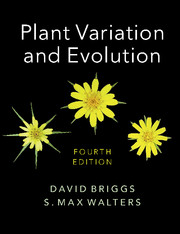Book contents
- Frontmatter
- Contents
- Preface to the Fourth Edition
- Acknowledgements
- Note on names of plants
- List of abbreviations
- 1 Investigating plant variation and evolution
- 2 From Ray to Darwin
- 3 Early work on biometry
- 4 Early work on the basis of individual variation
- 5 Post-Darwinian ideas about evolution
- 6 DNA: towards an understanding of heredity and molecular evolution
- 7 Breeding systems
- 8 Intraspecific variation and the ecotype concept
- 9 Pattern and process in plant populations
- 10 Pattern and process: factors interacting with natural selection
- 11 Populations: origins and extinctions
- 12 Species and speciation: concepts and models
- 13 Allopatric speciation and hybridisation
- 14 Abrupt speciation
- 15 The species concept
- 16 Flowering plant evolution: advances, challenges and prospects
- 17 Historical biogeography
- 18 The evolutionary impact of human activities
- 19 The taxonomic challenge ahead
- 20 Conservation: from protection to restoration and beyond
- Glossary
- References
- Index
Preface to the Fourth Edition
Published online by Cambridge University Press: 05 June 2016
- Frontmatter
- Contents
- Preface to the Fourth Edition
- Acknowledgements
- Note on names of plants
- List of abbreviations
- 1 Investigating plant variation and evolution
- 2 From Ray to Darwin
- 3 Early work on biometry
- 4 Early work on the basis of individual variation
- 5 Post-Darwinian ideas about evolution
- 6 DNA: towards an understanding of heredity and molecular evolution
- 7 Breeding systems
- 8 Intraspecific variation and the ecotype concept
- 9 Pattern and process in plant populations
- 10 Pattern and process: factors interacting with natural selection
- 11 Populations: origins and extinctions
- 12 Species and speciation: concepts and models
- 13 Allopatric speciation and hybridisation
- 14 Abrupt speciation
- 15 The species concept
- 16 Flowering plant evolution: advances, challenges and prospects
- 17 Historical biogeography
- 18 The evolutionary impact of human activities
- 19 The taxonomic challenge ahead
- 20 Conservation: from protection to restoration and beyond
- Glossary
- References
- Index
Summary
In writing the earlier editions of Plant Variation and Evolution, with my great friend Max Walters (1920–2005), our approach to this complex subject was clearly set out in the preface to the Third Edition. ‘When it was first proposed to establish laboratories at Cambridge, Todhunter, the mathematician, objected that it was unnecessary for students to see experiments performed, since the results could be vouched for by their teachers, all of them of the highest character, and many of them clergymen of the Church of England’ (Bertrand Russell, 1931). While Russell's mischievously anti-clerical comments do not entirely reflect the views of Todhunter (Todhunter, 1873; Macfarlance, 1916), they do provoke us to take a critical look at the way scientific advances are made, in every historical period, through questioning the opinions of various ‘authorities’. In many texts on evolution a judicious mixture of concepts, mathematical ideas and the results of laboratory and field experiments are combined in an elaborate pastiche to provide a more or less complete edifice. Perhaps one or two areas of uncertainty may be indicated, but the general impression is of a house well built, but awaiting the placing of the last few roof-tiles. Conversations with research biologists, however, quickly reveal a different picture. While the broad outlines of evolution are supported by an increasing body of evidence, almost nothing is completely settled: current views represent a provisional framework, and even some parts of the subject, long held to be clarified, are suddenly overturned by new discoveries. Teaching experience reinforces our view that students of science should be shown the way in which, slowly and painstakingly, our present partial pictures have been built up, how and to what extent they are testable by experiment and observation, and in what way they remain vague or defective. A healthy scepticism in the face of the complexities of organic evolution is the best guarantee of real progress in understanding its patterns and processes.
The aim of this new edition is to provide, as before, an authoritative introductory university text, while at the same time satisfying the general reader with a real interest in the subject, showing how the study of variation and evolution of flowering plants has developed over the last 400 years. This development has been increasingly scientific, leading to the realisation of the crucial importance of hypothesis and experiment.
- Type
- Chapter
- Information
- Plant Variation and Evolution , pp. xiiPublisher: Cambridge University PressPrint publication year: 2016



